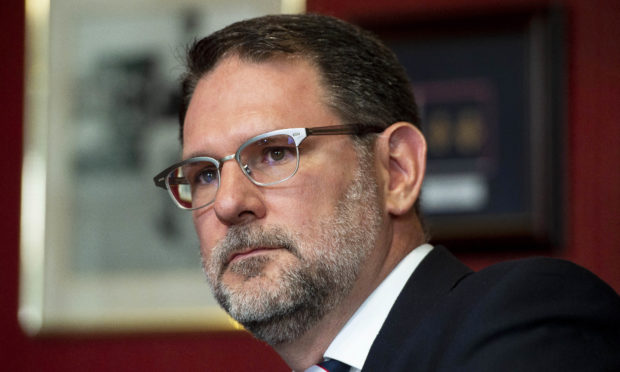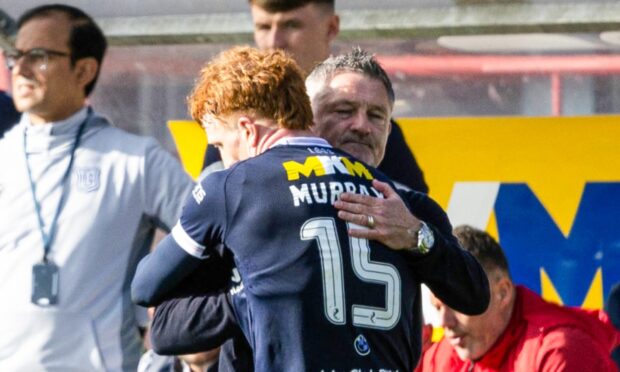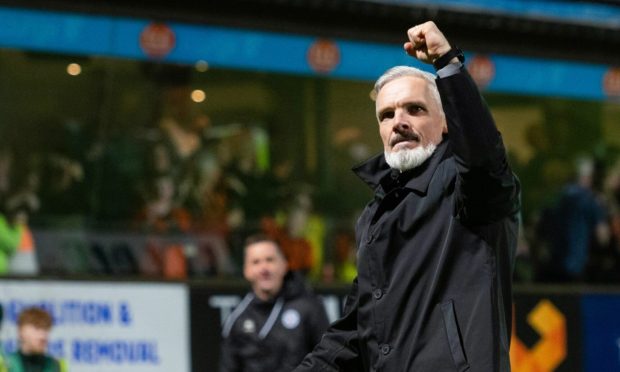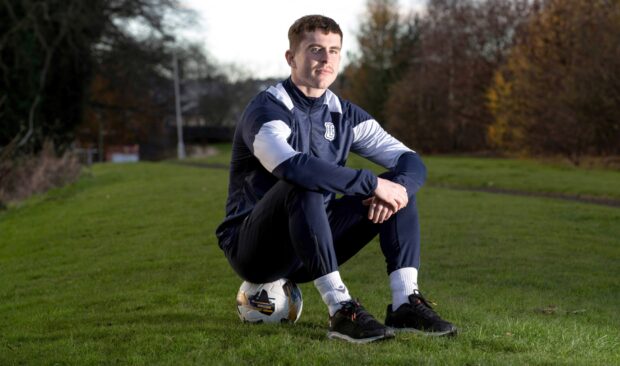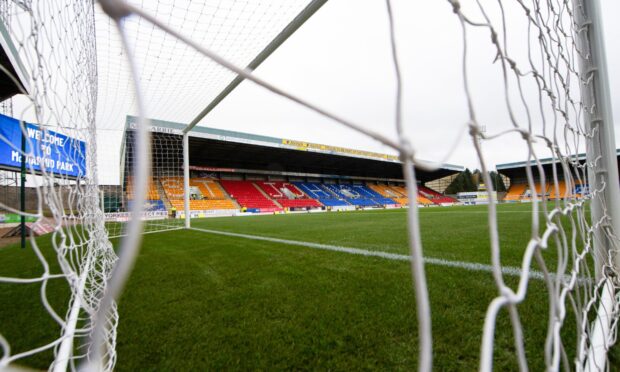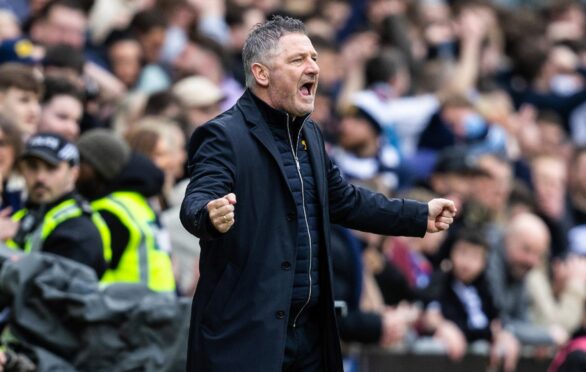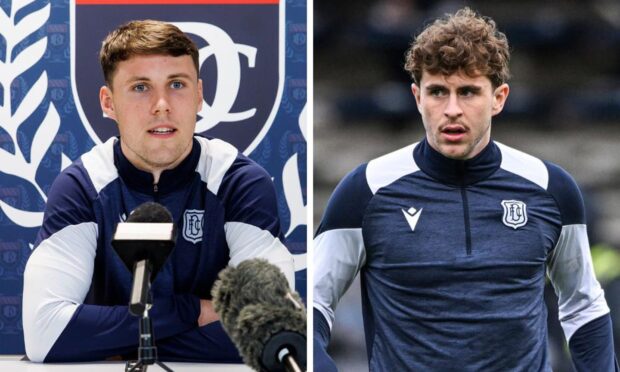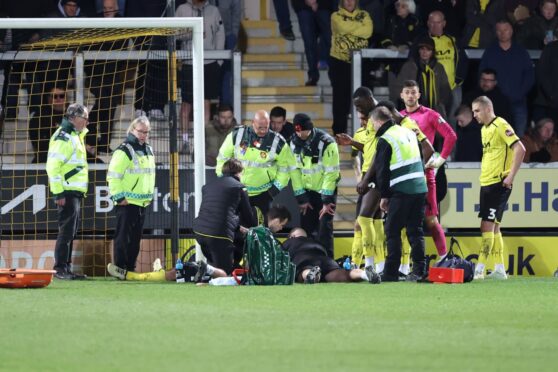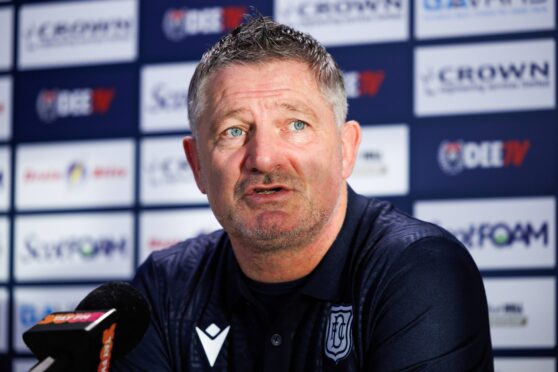Ever since his deciding ballot ended the lower-league season, John Nelms has been cast, by some, as a sinner in the SPFL vote saga.
The Dens Park supremo was front and centre of the crisis that engulfed Scottish football this month after his ‘no’ vote failed to reach the SPFL’s email account and left him with the fate of the game in his hands.
Five days later, he switched Dundee’s vote to a ‘yes’, passing the resolution that ended the 2019/20 campaign in the bottom three divisions.
Speculation over what sparked Nelms’ change of heart has raged ever since, but the Dundee chief has remained silent.
Until today.
Finally, in a sit down interview with Courier Sport, Nelms has lifted the lid on the events of the last month, and on his hopes for Scottish football’s future – and we are giving his story to you exactly as he gave it to us.
George Cran: You stated at the start you were going to vote ‘no’ to the SPFL’s resolution, what were your thoughts on it to begin with?
John Nelms: From the beginning, I didn’t want anything to go out that would hurt anybody at all. We had very limited time to look at things. The document itself didn’t give much hope for reconstruction and didn’t do a lot of things. For me, I wasn’t just thinking of Dundee Football Club but other clubs who would be hurt in all of this. That was my main focus – I didn’t want anybody to get hurt.
The change came after a lot of conversations with a lot of clubs and the appetite for reconstruction was greater than I first thought. There are other things, which I don’t want to get into, but we were trying to help these clubs who were going to be hurting. I was trying to soften the blow for everybody but also trying to use the time [between the deadline and submitting the ‘yes’ vote] to make Scottish football, through reconstruction, a better overall product that has more value going forward. That’s something we have been discussing for a long time, but we have the time now to really dig in and look at it. Getting to that stage, we had over 80% of the clubs vote a certain way so, in order to get going, so to speak, I changed my vote so we could get on to the next phase.
As far as the Premiership goes, all we did was vote to put it into the hands of the board. They now have in their hands the chance to say what they want to do with it. They can try to play [the remaining matches] later. There are options they will have to weigh. We weren’t weighing those options.
GC: What went through your mind when you saw the incomplete vote had been published?
JN: I wasn’t best pleased. I know there was a statement saying: “We had to put something out because we had a board meeting,” but the statement could have been as simple as: “We have an incomplete vote, there is a statutory 28 days and we have not received every vote.” By the way, it wasn’t just our vote, there were others that weren’t received either. They could have said it was an incomplete vote without any detail and that would have been more appropriate in my opinion.
GC: At that point, you have said you weren’t aware it was your vote that was missing, what did you think then?
JN: I don’t know what happened, I have no idea. What they say is it got caught in the spam folder, which you have to believe. We did intend to vote a certain way and then changed it after I had more information. I talked with a lot of people. I pace when I talk on the phone. The Saturday, I walked 13.8 miles while on the phone, mostly inside my house. I averaged over the period before I voted over 11 miles a day, just on the phone.
GC: What was the major part of changing your vote?
JN: The biggest thing was, the only way I could see, once we knew what was happening, that we could help anybody – it’s not just helping people but a longer-term, bigger picture – is reconstruction. Speaking with a lot of clubs, there was much more of an appetite for reconstruction than I understood going into this. That was the main thing.
GC: Can you understand why other people saw Dundee as the bad guy?
JN: Obviously, people think we have handed United the league, Rangers think we have handed Celtic the league, although that is in the hands of the board, which they have a representative on. Over 80% voted for it and it was going to happen one way or the other – we represent 3% of that vote, total. The only way going forward would be league reconstruction. Yeah, I can see why I am the bad guy, but 81 or 82% of the league are also that same bad guy. The league did, in putting it out there, put us in a bad position.
GC: The WhatsApp messages (between Dundee and other Championship clubs, leaked in the days after the initial vote deadline passed). Did that influence your thought process?
JN: It’s unbelievable. The way that was handled was not businesslike and was very poor. It has caused a lot of bad blood throughout the league, the way that was done, taking private messages and putting them out there. Of course, they have been taken out of context at some levels because you don’t know exactly what was going on and what the conversations were. There were a lot of conversations going on at that time, loads of them, so you don’t get the full context of it but you do get one view and that’s what they wanted.
GC: You mentioned ‘handing’ Dundee United the Championship. Did that come into the thinking at any point?
JN: Obviously as Dundee Football Club, we don’t want to hand our rivals anything but, at the end of the day, it was inevitable that was going to happen. I had several conversations with Mal [Brannigan, Dundee United managing director] throughout this, several conversations with Rangers, with Celtic, with Hearts, I’ve had conversations with quite a few people. You could tell early on that there would be promotion/relegation and there was no way around it because over 80% of the clubs wanted that to happen. Whether or not we wanted that to happen, it was going to happen. I’m not going to make a decision based on what happens to United – I have to make the decision on what’s best for Dundee Football Club and what’s best for Scottish football.
GC: To make it clear, what was the benefit to Dundee in changing your vote?
JN: We were in the worst position possible – we were in third place. There’s not much benefit one way or the other that we could get out of this. When people ask me that – I ask what do you think we could we have gotten out of this? So, the best thing we could possibly get out of this is a proper conversation about reconstruction. That might not benefit us in the short-term, but in the long-term, it would benefit Dundee FC and all of Scottish football. That, for me, was the best thing we could get out of this. Does that do anything for us right now? No. But we need to look at it in a much bigger, broader picture as opposed to: “What does it do for me right now?”
GC: After the whole process, are you happy with the end result?
JN: I’m not happy with the overall process, I’m not happy with where we are, I’m not happy football clubs are losing money, I’m certainly not happy people are dying of coronavirus in the wider world. We still don’t know what is actually going to happen. All of this might be for nought, we might be shut down for a long, long time and be having much different conversations in the future. You can never be happy in these situations, just be pragmatic and get through it as best as we can.
GC: Are you confident reconstruction is going to happen and benefit the game in the long-term?
JN: We are having good conversations. We have to jump through a load of hoops and we have 42 clubs we have to satisfy, on some level. For me, the most important thing in this is that Scottish football – and, in turn, Dundee Football Club – comes out with a product that is better than we currently have. Sky Sports and our media partners need to be a part of this, too, and help us understand exactly what it is going to take in order for us to be a more attractive product, a more saleable product. We want to be on TV, we want more people to come to games, we need to make games have more meaning, we have to do things that might be outside of the box to bring viewers to the table – that’s the angle I come at it from. I can’t talk to you about the specifics of what the group is talking about because we are trying to work through all of these things but the principle, from my point of view, is we have to absolutely make it a more attractive proposition for fans and for viewers. There are ways of doing it.
What I want to get out of it all is a product that is better; that, in turn, brings more money in; that, in turn, makes the product even better and it turns full circle. For me, that’s the goal. It’s a long-term vision but we have the time right now to pay attention to that and work through these things. It might end up this scenario ends up being a change-stage process, whenever we get started again, for 2020/21, and then reconstruction might start in 2021/22.
GC: Do you have a preference for which way the league might be set up?
JN: I really can’t talk about that because of the [reconstruction working] group I am in. A lot of the setups have merits, a lot have issues but as long as whatever format is setup makes it more valuable, more interesting, then I would be open to just about any type of system. At the end of the day, the top tier brings in the most money and that’s where the eyes are but we have to be conscious of down the leagues, they rely more on gate than TV money, and we have to make sure those games are maintained or even enhanced in some way. It is a balancing act, it’s not as simple as just I like this one or that one.
GC: How confident are you we might get consensus at the end of this?
JN: I don’t know. We have only had two meetings so far. There has been a lot of work gone into those meetings. I think if we get to a proposition where all clubs benefit financially, the pie actually grows rather than just cutting it up in different ways, you’d have a better chance of getting a consensus. If the goal makes the product better and eventually the product is worth more, that makes more sense – if you just change for the sake of it, it doesn’t make much sense to me.
GC: Do you see it being better to make a permanent change or a temporary one, like was suggested in Hearts’ first statement after the reconstruction talks were announced?
JN: I don’t know, that’s the problem. I don’t think it’s as simple as we can make one big change right away. I think it might be something that phases in over time. But like I said, we have to have all the stakeholders talking in order to see what that means. We have to make sure all the contracts are being satisfied and these conversations take time. It might be that we have a staged-process but at this point, we are so early in the process, I don’t know what that would 100% look like. We are still working through all the iterations.
GC: Getting all the stakeholders talking – has that been made more difficult by the way things have happened over the past few weeks?
JN: I think within the group, it’s been fine. Everybody is professional. Honestly, there has been no animosity on the phone calls. Any time we run through anything like this, tensions run high and people say things and do things. For the most part, it’s just business and forgivable and off you go. There may have been one or two things that were done that will be more difficult for people to let go but, hopefully, we can all focus for the proper greater good of the game. If we have a proposition that is best for everybody, I would hope we look at the proposition and not really consider anything else.
